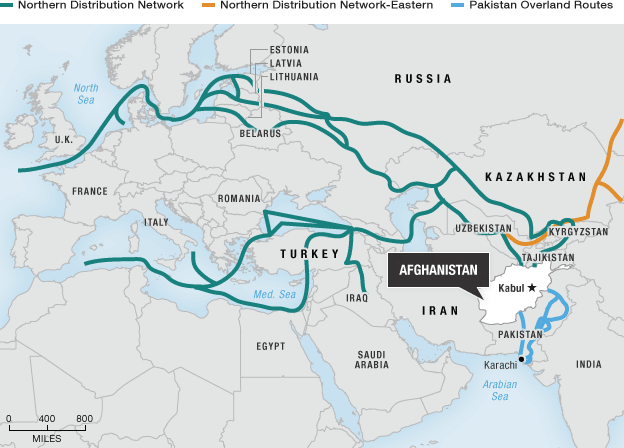Our dependence on the lines of logistics through Chaman and the Khyber Pass, as well as Pakistan’s duplicity towards the U.S., are well-worn issues with regular readers. The Northern logistics routes are in increased and expanding usage due to the troubles in Pakistan.

Image courtesy of EagleSpeak. The magnitude of the challenge is well described for us by Vice Adm. Mark Harnitchek, deputy commander of the U.S. military’s Transportation Command.
“This is the logistics challenge of our generation” … “The challenge of my father’s generation was escorting convoys across the north Atlantic when we didn’t know how to do that very well. Convoys in 1943 would lose 16 of their 32 ships. The Army had their challenge supplying Patton in his race across France, keeping him resupplied. Supporting operations in Afghanistan is our generational challenge.”
For the first seven years of the war in Afghanistan, almost all supplies and equipment were shipped by sea to the Pakistani port of Karachi. From there, they were trucked overland to Afghanistan, through parts of Pakistan effectively controlled by the Taliban.
In 2008, according to Harnitchek, the U.S. military lost as much as 15 percent of its supplies in those areas due to ambushes and theft. Establishing another supply route became a top priority.
Near the beginning of 2009 I explained the necessity for the Northern logistics route, and described it in detail. The routes shown above come close, but still rely on Russia and fail to engage Turkmenistan. I recommended that we develop a route “through the Caucasus region, specifically, from the Mediterranean Sea through the Bosporus Strait in Turkey, and from there into the Black Sea. From the Black Sea the supplies would go through Georgia to neighboring Azerbaijan. From here the supplies would transit across the Caspian Sea to Turkmenistan, and from there South to Afghanistan.”
I explained the urgency of the situation, and also described in subsequent posts on logistics how reliance on lines of logistics through Russia could affect the outcome of New START as well as endanger Georgia and cause another Russian incursion into the Caucasus (Ossetia and beyond). Yet we are still lethargic concerning full development of the Northern logistics routes.
The urgency is still present, and we continue to see further examples of Pakistani duplicity.
As targeted killings have risen sharply across Afghanistan, American and Afghan officials believe that many are the work of counterintelligence units of the Haqqani militant network and Al Qaeda, charged with killing suspected informants and terrorizing the populace on both sides of the Afghanistan-Pakistan border.
Military intelligence officials say that the units essentially act as death squads and that one of them, a large group known as the Khurasan that operates primarily in Pakistan’s tribal areas, has been responsible for at least 250 assassinations and public executions.
The Haqqani network is, of course, coddled and enabled by the Pakistani ISI. For some inexplicable reason the otherwise clear thinking Bing West comments concerning this report that:
The administration has to adopt a tough, transactional negotiating posture with Pakistan.
What is this song of enchantment that Pakistan continues to sing to its disappointed suitors? Is it nuclear weapons? There is the need for robust Pentagon war gaming concerning the securing of Pakistan’s nuclear weapons, as I have described. Is it the belief that more negotiations will convince Pakistan not to support the Afghan Taliban? Is it the belief that Pakistan isn’t really controlled by Islamic fundamentalism, or that the Army isn’t preoccupied with fabricated and delusional notions of danger from India?
Whatever it is, we are years behind schedule in divorcing ourselves from Pakistan, whether concerning logistics or reliance on their internal security over their nuclear arsenal. The Obama administration is “scrambling to repair” relations with Pakistan, as I would have expected. But leaving the juvenile and moving to the adult, when even most knowledgeable analysts are suggesting that we need to take a tough negotiating stance and repair relations with Pakistan, we have a problem.
These relations with Pakistan never really existed. Pakistan’s ultimate aim has never changed, even though the campaign has evolved. Pakistan wants its high-powered insurgents (e.g., the Haqqani network) in order to effect change in Afghanistan (on its whim) and convince India that it is a force to be reckoned with, Kashmir or elsewhere. Pakistan isn’t an ally of the U.S., and never was. It’s time to stop pretending that they are. It is always difficult to face the truth, but time is short and the situation is dire.
All monies should cease, lines of logistics should shift completely to the North, and in the future if Pakistan wants to engage the U.S. as an ally, it must start over and prove itself. We must always negotiate from a position of strength, as we learned from Sun Tzu.




